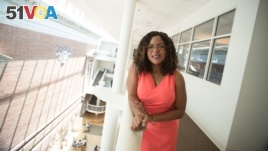19 December 2020
Dominique, not her real name, is a Black electrical engineering doctoral student. She found herself in a difficult situation at a conference.
A white man thought a nearby Black woman was a hotel cleaner and asked her to clean their table. The woman did as she was asked, but she also told him that she was the main speaker at the conference. The man did not say he was sorry. He made a joke about how the woman could have two jobs.
Other white people at the table looked at Dominique waiting for her to approve of the joke. Dominique was not prepared for this. She acted as if she was laughing. The others laughed, too, but their laughter sounded real to her.

Ebony McGee, PhD. is the Associate Professor of Diversity and STEM Education at Peabody College of Vanderbilt University.
Leon, also not his real name, is a Black doctoral computer science student. He was picking up a visiting female professor at the airport. He had spoken to her over the phone several times. When Leon approached the professor, she backed away and asked him to call his doctoral adviser to confirm his identity.
Ebony O. McGee teaches diversity at Vanderbilt University. She says stories like this are common. She has collected about 300 of them in her research over the past ten years on structural racism in STEM fields: science, technology, engineering and math. As a result of these incidents, she says, many Black and Hispanic students leave the STEM fields.
Managing stereotypes
McGee says the students spend much of their energy on so-called "stereotype management." It means they have to take specific actions to deal with unfair and untrue beliefs they face as a result of their identity.
These students, she says, have to deal with a mainly white STEM community in which they are seen as unskilled and undeserving of opportunities.
McGee has found that the stereotypes also give Black and Hispanic students a stronger reason to succeed and, at times, to become the best at what they do. They want to disprove the idea that they are not worthy of being in STEM fields.
Sometimes stereotype management involves putting certain things on display, like leaving a high test score on a STEM test on a desk for others to see.
It can also involve keeping certain things hidden. Some Black students report that they kept their own children hidden to avoid the stereotype of single Black mothers. McGee says some STEM professors do not want to work with such students. They mistakenly believe they will have less time to work in the laboratory than students who are not parents.
In her recent book on STEM education, she says it takes much of their energy and uses resources that could help them be creative. And that extra attention to stereotype management can cause problems with their mental and physical health.
That leads to them leaving STEM. Research shows that Black and Hispanic students leave the fields at nearly twice the rate of white students.
How to help
McGee says the answer is not to have more students of color featured on university websites or other publications. Higher education must pay more attention to the students' college experience, their well-being, and how others view them. She says more attention should be paid to the reasons that students of color stay in STEM programs than the reasons why so many leave.
McGee's future projects involve students creating their own STEM businesses, she said, "where Black folks can stop begging these white companies for a job and create their own kind of ecosystem."
I'm Jill Robbins.
Ebony O. McGee wrote this story for The Conversation. Jill Robbins adapted it for Learning English. Hai Do was the editor.
________________________________________________________________
Words in This Story
diversity – n. the state of having people who are different races or who have different cultures in a group or organization
stereotype – n. an often unfair and untrue belief that many people have about all people or things with a particular characteristic
management - n. the act or process of controlling and dealing with something
undeserving – adj. not having qualities that deserve praise or support
beg – v. to ask (someone) in a very serious and emotional way for something needed or wanted very much
ecosystem – n. everything that exists in a particular environment
Are you studying or working in one of the STEM fields? Have you faced discrimination based on your race or gender? We want to hear from you. Write to us in the Comments Section.